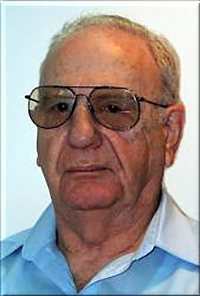Dr. Abraham Ber chose mechanical engineering as a tribute to his father, who did not live to complete a degree in the field. His loyalty and dedication to research and teaching often led him to refuse offers highly sought-after positions, and kept him connected to Technion, where he also found true friends, until his last days.
Abraham Ber was born in 1926, the second son of parents who immigrated from Poland in 1919. He is considered a native of Israel, but was, in fact, born in Warsaw. Towards the end of her pregnancy, his mother decided to go visit her parents and give birth to her second child in Poland due to the conditions in Israel. When Abraham was four months old, they returned to Israel. His father studied mechanical engineering at the Technikum in Belgium, but was unable to complete his degree before immigrating to Israel. “He had only a few months left to finish his degree, and since he admitted this when entering Israel, he was not considered an engineer here. This was apparently an important reason my father decided to study mechanical engineering,” says his daughter Orit.
In Israel, Ber’s father worked for Israel Railways, while his mother Chaya opened a fur processing factory and a fur shop in the 1940s. The factory and store were located in the family’s home on Herzl Street in Haifa. In the house, Abraham, his older brother and their cousin, who was sent from Poland to live with the family, grew up together. These were the days of the British Mandate, and the country was teeming with activity of underground organizations. The three young Ber boys were active in the underground, and the British even came to the family’s home on one occasion to look for them. Their mother Chaya had to deny their involvement and defend them. Later, in the early 1940s, Ber enlisted in the Haganah and from there continued to the Palmach. He served as a sapper, sniper and intelligence man, and participated in the Night of the Bridges. In the army, he met his wife Stella (Esther), a survivor of Nazi persecution in Bulgaria, and in 1949 they married, while still soldiers.
As a teenager and adult, Abraham was enthusiast of history, particularly the history of Israel. The decision to study mechanical engineering was inspired by his father. “My father’s love and passion, who was a man of letters and spoke fluent Hebrew, to study history and the Bible remained with him throughout his life,” say his daughters, who also say they grew up in a home of culture. “Dad loved listening to classical music, dancing, literature and history. He also knew how to draw beautifully and taught us perspective,” Yael recalls.
 In 1954, Ber completed his bachelor’s degree in mechanical engineering at the Technion. He then went to work for several months in a factory in Holland, and upon his return the family moved to Kibbutz Hanita, where he worked as an engineer for a year. In 1957, he completed his master’s degree at the Technion and embarked on his doctorate at MIT in the United States. Due to administrative changes at the Technion, however, he was called back, completed his doctorate, and began teaching and supervising students. His research and teaching interests were production methods of mechanization and processing processes and the resistance of metals to strength and heat. Over the years, he took sabbaticals in the United States, where he worked for Ford and General Electric. “During sabbaticals, he received many offers to stay and work in the United States, but because he was an ardent Zionist, he never accepted them,” says Orit.
In 1954, Ber completed his bachelor’s degree in mechanical engineering at the Technion. He then went to work for several months in a factory in Holland, and upon his return the family moved to Kibbutz Hanita, where he worked as an engineer for a year. In 1957, he completed his master’s degree at the Technion and embarked on his doctorate at MIT in the United States. Due to administrative changes at the Technion, however, he was called back, completed his doctorate, and began teaching and supervising students. His research and teaching interests were production methods of mechanization and processing processes and the resistance of metals to strength and heat. Over the years, he took sabbaticals in the United States, where he worked for Ford and General Electric. “During sabbaticals, he received many offers to stay and work in the United States, but because he was an ardent Zionist, he never accepted them,” says Orit.
Best Friends
Prof. Ehud Lentz met Ber during his master’s studies, and the two formed a close and deep friendship that lasted until Ber’s death. “Abraham and I were born on the same day and at the same time, only in a different year,” says Prof. Lentz, adding, “We discovered this in 1956, when we met as graduate students, and we became best friends. We were both taught by Prof. Ehrenreich, and after completing our degrees we went separate ways for some time as it was not possible to do a PhD at the Technion at the time. I went to Switzerland and Abraham to the United States. Then we worked together when I went on a sabbatical to Michigan, USA, to work for Ford.”
The true friendship between Ber and Lentz extended beyond the walls of academia. They both loved history and would read and discuss things together, and sometimes historical events brought them together. “In the Six-Day War, we looked out for each other. I was in Kiriat Shmona and I was shelled, whereas Abraham served in the sniper unit in Modi’in but was stationed on the mountain opposite,” recalls Prof. Lentz.
At the Technion, everyone knew the Bar-Lentz duo. Prof. Lentz says that when he walked around the Technion alone, people would ask him where Abraham was. Over the years, Lentz accepted administrative positions at the Technion, and also served as dean of the Faculty, while Ber remained a researcher and teacher throughout his life, although over the years he also held public positions at various institutions. Among other things, he served as Chairman of the Curiculum of the Ministry of Education’s Vocational Schools (1966-1968), and as the representative of Israel and the Technion at the UN International Conference on Industries in Developing Countries (1966).
In 1967, Dr. Ber was one of the first in Israel to join the International Academy of Tools and Materials Engineering, and later served as one of its magazine’s editors. In 1968 he was accepted as a member of the American Society of Mechanical Engineers (ASME), a membership that made him very proud, and he received a medal for his contributions.
For many years, Dr. Ber served as a permanent and highly respected consultant to Iscar, owned by Stef Wertheimer, who often offered him a partnership. Ber, however, who loved teaching and supervising students, preferred to stay at the Technion.
Dr. Ber most likely considered Stef Wertheimer’s proposal seriously. His daughters say that their father was a very level-headed man and made decisions after thinking about them carefully. It is somewhat surprising, therefore, to discover that he incorporated other decision-making methods into his life. His daughter Orit remembers him telling her how he solved some of his scientific problems with dreams. “There was one case where he came up with a solution he wasn’t completely happy with, and at night dreamed of the right solution,” she recalls.
He Knew How to Talk Wisely
Between 2010-2015, Prof. Ber wrote a comprehensive book on metal processing and durability. The book is the basis of all knowledge and a summary of his legacy in the profession. However, due to a copyright issue with three charts that appear in the book and whose draftsmen passed away, the book could never be published. This left him deeply disappointed. His daughters are currently exploring the possibility of publishing the book.
“Dad had the ability to talk to anyone and explain complex things simply,” says his daughter Orit. This ability benefited not only his students, but also his relatives and acquaintances. His daughters remember that while they were on sabbatical in Michigan, Yael, who was in first grade, underwent eye surgery and suffered from vision issues, which made it difficult for her to learn English. “Dad invented a special method to help her learn to read and write and would sit with her very patiently for hours,” says Orit. “It was like that until the last minutes of his life. When he was in the hospital, his therapist sat next to him and talked to his daughter on the phone, trying to help her with her algebra. Dad pulled out answers from his sickbed. He was lucid until the end,” Yael adds.
“He was also nonjudgmental and always saw the person in front of him and knew how to speak to them wisely,” Yael adds. “He was very sociable. He loved to tell stories and found a common language with his young grandchildren. With my sons, for example, it was playing chess.”
Prof. Ber loved to travel in Israel and around the world, and together with his wife brought many stories, sights and tastes, and was even an amateur photographer from his young days.
“Above all, Abraham was such a good friend,” Prof. Lentz said longingly about his best friend, “a very open and attentive person, someone you could share things with and talk to about everything. A friend who was always there and came when you needed him. He was willing to do anything for the friendship, even if you called him in the middle of the night to tell him that your back hurt.”
Dr. Abraham Ber worked at the Faculty of Mechanical Engineering until the age of 78. He continued to attend the Technion Seniors Club and travel to conferences until the end of his life.







